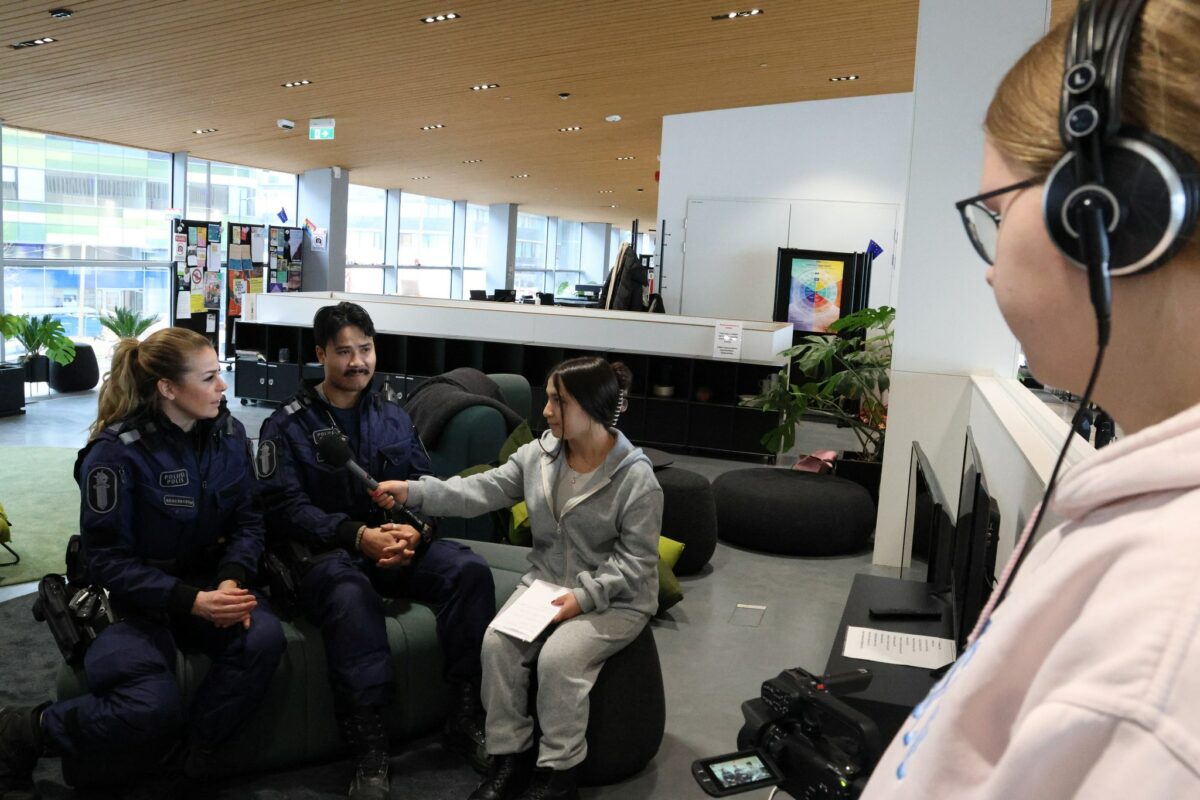
Head of Greenpeace’s power phrase, a Member of Parliament’s encouraging father and a police officer’s reason for choosing the profession – young people’s pop-up editorial team investigates
During the winter break, the City of Helsinki Youth Services organised a pop-up editorial team at Helsinki Central Library Oodi. In this editorial team, young people had the opportunity to interview and video individuals in influential positions in society. The young journalists asked their interviewees questions of their own choice, to which the interviewees provided answers.
Strength in numbers when protecting nature
Touko Sipiläinen, Head of the environmental organisation Greenpeace in Finland, was asked about aspects of the organisation’s work that may not be widely known. Sipiläinen explained that besides campaigning on social media and in the streets, the organisation also maintains contact with the companies and decision makers targeted by their campaigns.
“For example, I often visit the nearby Parliament House to talk with Members of Parliament,” said Sipiläinen.
Sipiläinen chose the phrase “You don’t have to manage everything on your own – let’s do it together” as his power phrase. Strength arises when many people desire change and work together to achieve it.
But what can individuals do to protect the environment? Sipiläinen suggested that at a societal level, one can make a difference by demanding that politicians take nature and the environment seriously. To make an impact, one does not need to be of voting age: even a young person can be an active voice in society.
“You can say that climate and nature are important to me, and I want Finland to protect them.”
Individuals can also make environmentally friendly choices in their own lives, such as buying fewer unnecessary things and reducing meat consumption.
Member of Parliament Nasima Razmyar: “It’s important that everyone has the opportunity to succeed”
Member of Parliament Nasima Razmyar was asked about the issues she wants to advocate for in Parliament. Razmyar emphasised the importance of every Finn succeeding in society.
“I know how crucial it is that, despite coming from different circumstances, you have an opportunity to succeed.”
Razmyar hopes that this opportunity is available to everyone, meaning that society guarantees education and well-being, for example.
Razmyar is concerned about the well-being and mental health issues of young people. They come at a high price. That is why it is important to focus on things that support individuals. These include above all education and public services.
Razmyar came from Afghanistan to Finland at the age of eight with her family – her father, mother and brother. It was difficult for her to leave her homeland. It changed the family’s life completely.
“People often think that we [immigrants] get everything. But it was the opposite: when we moved, we lost everything.”
Razmyar is very close to her family. She highlighted the support she received from her father in both political and personal aspects of her life.
“He has encouraged me to move forward, to be strong and to fight for those who can’t – in Afghanistan, for example.”
In conclusion, Razmyar pledged that, together with other Afghan-background girls, they can share their stories with the world and remind everyone that girls are strong too.
Police build trust where young people are
For Constable Michela Söderström, working in the police force was a childhood dream. After upper secondary school, Söderström thought she was still too young to become a police officer. She trained for another profession before applying to the Police University College. Senior Constable Anton Saari, on the other hand, became a police officer because he enjoys helping and protecting people.
When asked about how they try to strengthen young people’s trust in the police , the constables mentioned initiatives such as reaching out to where young people are, such as shopping centres and social media.
“We talk to young people, show genuine interest in them and ask how they are doing,” listed Saari.
Söderström also mentioned that the police aim to be present where young people are. Through social media channels, young people can easily contact the police if something is troubling them. Social media also provides a platform to discuss various situations young people may have encountered with the police. In turn, the police can explain why they act in certain ways and assist young people.
Young people were interested in the police officers’ thoughts on immigrants. The officers stated that in the eyes of the law, all people are equal, and it does not matter where someone comes from. If someone commits a crime, the situation must be addressed. Everyone is treated the same way.
“The rules are the same for everyone,” concluded Saari.
Toimittajat: Khatime Amini, Walina Amini ja Matilda Miettinen
